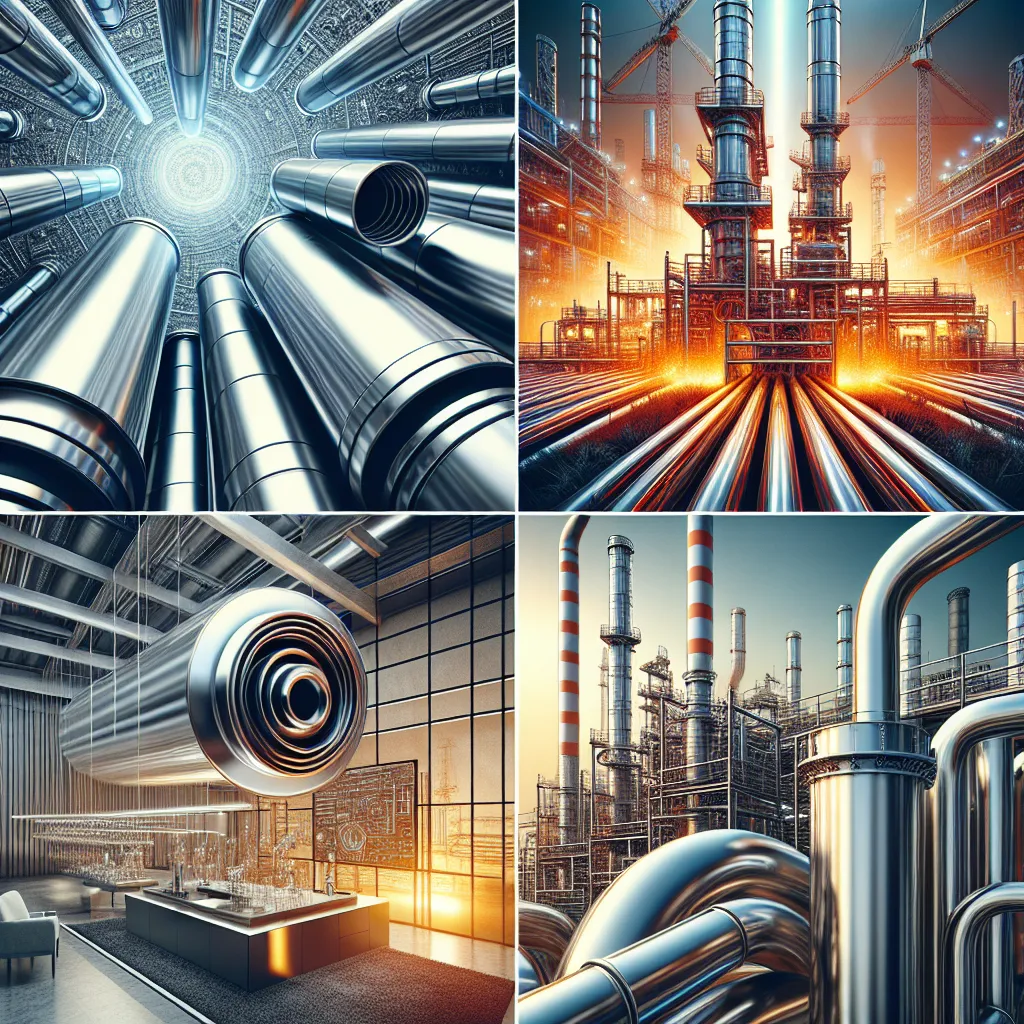Exploring the Benefits and Applications of Stainless Steel Pipes
Exploring the Benefits and Applications of Stainless Steel Pipes
Introduction
Stainless steel pipes are widely used in various industries due to their exceptional properties and versatility. In this article, we will delve into the benefits and applications of stainless steel pipes, shedding light on their importance in modern infrastructure and everyday life.
What is Stainless Steel?
Stainless steel is a type of steel alloy that contains a minimum of 10.5% chromium. This chromium content forms a protective layer of chromium oxide on the surface, which gives stainless steel its renowned corrosion resistance. Additionally, stainless steel contains varying amounts of other elements such as nickel, molybdenum, and titanium, which enhance its mechanical properties.
Benefits of Stainless Steel Pipes
1. Corrosion Resistance
One of the prime advantages of stainless steel pipes is their exceptional resistance to corrosion. The chromium oxide layer on the surface acts as a barrier, protecting the underlying steel from oxidation, moisture, and other corrosive elements. This makes stainless steel pipes suitable for various applications in corrosive environments, such as chemical processing plants, marine structures, and wastewater treatment facilities.

2. Strength and Durability
Stainless steel pipes exhibit excellent strength and durability, making them ideal for demanding applications. They can withstand high pressures, extreme temperatures, and mechanical stresses without undergoing deformation or failure. This characteristic makes stainless steel pipes a reliable choice for industries such as oil and gas, construction, and automotive.
3. Hygiene and Cleanability
Stainless steel pipes are highly hygienic and easy to clean, making them suitable for industries that require strict sanitation standards. The smooth surface of stainless steel pipes prevents the accumulation of bacteria, making them a preferred choice in food processing, pharmaceutical manufacturing, and healthcare facilities. Moreover, stainless steel can withstand frequent cleaning with harsh chemicals without deteriorating or losing its properties.
4. Aesthetic Appeal
Aside from their functionality, stainless steel pipes also offer aesthetic appeal. The shiny and reflective surface of stainless steel pipes adds a touch of modernity and sophistication to architectural designs, interior decor, and even artistic installations. Their versatility in design and finishes allows for customization and integration into various visual concepts.
5. Sustainability
Stainless steel is an environmentally friendly material due to its recyclability. It can be recycled endlessly without losing its properties, making stainless steel pipes a sustainable choice for infrastructure development. Additionally, stainless steel production processes have improved over the years, reducing energy consumption and minimizing environmental impact.
Applications of Stainless Steel Pipes
Stainless steel pipes find extensive use across various industries and applications. Let’s explore some of the key sectors where stainless steel pipes play a crucial role:
1. Oil and Gas Industry
In the oil and gas industry, stainless steel pipes are used for transporting oil, gas, and other fluids. They can withstand high pressures and corrosive environments, ensuring the safe and efficient transfer of petroleum products. Stainless steel pipes are also utilized in refinery plants, offshore drilling platforms, and petrochemical facilities.
2. Construction and Infrastructure
Stainless steel pipes are widely employed in the construction industry for structural purposes. They are used in building frameworks, bridges, and tunnels due to their strength, durability, and resistance to harsh weather conditions. Stainless steel pipes also find application in plumbing systems and HVAC (Heating, Ventilation, and Air Conditioning) installations.
3. Water and Wastewater Treatment
Stainless steel pipes play a vital role in water and wastewater treatment plants. They are used for conveying water, chemicals, and effluents, withstanding the corrosive nature of the substances involved. Stainless steel pipes ensure the integrity and longevity of the piping systems in these critical facilities.
4. Food and Beverage Industry
The food and beverage industry heavily relies on stainless steel pipes for hygienic and corrosion-resistant piping solutions. Stainless steel pipes are used in food processing, breweries, dairy plants, and bottling facilities. They maintain the purity of the conveyed products and meet the stringent hygiene standards required in these industries.
5. Automotive Sector
In the automotive industry, stainless steel pipes are utilized in exhaust systems, fuel delivery systems, and brake lines. Their resistance to high temperatures and corrosive gases makes them ideal for withstanding the harsh conditions encountered in vehicle operation. Stainless steel pipes contribute to improved performance, fuel efficiency, and longevity of automotive components.
Conclusion
Stainless steel pipes are indispensable in various industries and applications, thanks to their remarkable properties and versatility. Their corrosion resistance, strength, cleanability, aesthetic appeal, and sustainability make them a preferred choice for critical infrastructure and everyday use. Whether in oil and gas, construction, water treatment, food processing, or automotive sectors, stainless steel pipes continue to play a pivotal role in advancing modern society.
